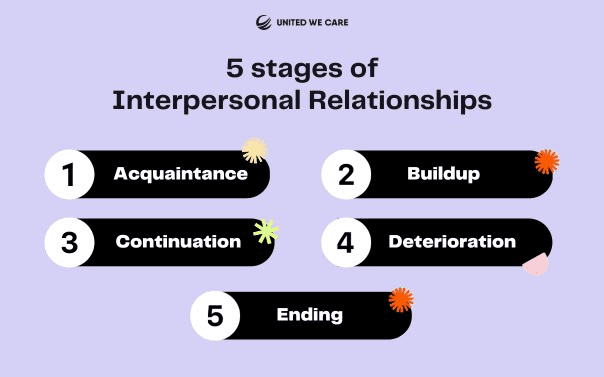Introduction
Relationships hold a very special place in the lives of humans. From your identity to your physical and mental health, everything depends on the people you form relations with. For instance, if most people around you call you a good person, you will uphold the belief that you indeed are a good person, will try to take care of yourself, and will feel supported or happy in your life. Thus, you must know how to form good relationships if you wish to live a good life. In this article, we will explore interpersonal relationships and help you understand how to form strong bonds with others.
What are Interpersonal Relationships?
Research in psychology has shown that in humans, just like there is a need for food or water, there is a need for affiliation [1]. This need for affiliation makes us want to form close bonds and attachments to other individuals. And the way we fulfill this need is by forming interpersonal relationships.
The word “interpersonal” comes from two words: “Inter,” which means between, and “person” -al, which means people or humans [2]. This means that interpersonal relationships are interactions between a person and the people around them. All relationships, be it friendships, familial relationships, romantic relationships, professional relationships, or acquaintances, come under this term.
While many people might mistake taking each other for granted, quality relationships are actually important for our survival. A number of researchers have documented this and have found that supportive relationships can actually increase our psychological well-being and can even lower the chances of falling ill [3]. Even in our work lives, in jobs where negative interactions are common and good relationships are rare, employees are dissatisfied and prefer to leave the company [4]. In other words, the effect of interpersonal relationships on our lives is profound.
Must read- trust in a romantic relationship
What are the Types of Interpersonal Relationships?
Not all relationships are the same. There are differences in degrees of intimacy, boundaries, openness, and even expectations in different types of relationships. Broadly, a human being usually has these 4 types of relationships [5] [6]:
- Family: Family relationships are the connections we have from birth and because of where we take birth. People like your parents, siblings, grandparents, cousins, aunts, uncles, etc, fall in this category. The connection you might have with your family members may vary depending on the type of childhood you have had and the type of culture you were born into.
- Friendships: These are bonds we make with people we like and are able to get connected to. Many people term their friendships as the most satisfactory in their lives as with friends. You can indulge in things you like, be free of roles and responsibilities, and cultivate trust and intimacy with the other.
- Romantic Relationships: Relationships with physical, emotional, and other forms of intimacy, commitment, and passion are our romantic relationships. There is deep trust and a great degree of dependence on your partner. In many situations, these relationships end in marriage.
- Work Relations: These are the relations we form in professional settings. These include relationships with your superiors, your subordinates, and your co-workers.
As might be obvious, the above list is not exhaustive of all the types of relationships. For example, you might have a landlord-tenant relationship, a neighbor’s relationship, or even a therapist-client relationship.
Read more about – Relationships and Love in the Time of Screen
Why are Interpersonal Relationships Important?
Just imagine what your day becomes when you have had a fight with your family member. Or what happens to you when you meet your friends after a long time? The importance of relationships on the quality of our lives is huge. To give you some points:
- Health and Well-being: There is a huge amount of evidence that says people who have supportive relationships around them are less affected by stressful situations [7]. In fact, both mental and physical health is better when relationships in life are good [3] [8].
- Social and Emotional Support: Good relationships provide support to the person. This support can be in terms of a social network or in terms of emotionally safe space, both of which help in dealing with the challenges of life.
- Meaning in Life: For many people, the meaning of life lies in having good relationships and people around them. In fact, many researchers have found that meaning in life and better relationships often go hand in hand [5] [9].
- Identity and Self-Esteem: The people around us influence how we define ourselves and what we feel about ourselves. When we are surrounded by good people, our self-esteem boosts, and we are able to be happier with who we are [8].
More information about – Love Addiction
What are the 5 stages of Interpersonal Relationships?
It is clear that relationships have a beginning, a middle, and at times an end. Many psychologists have attempted to describe this process in a more concrete way. One such psychologist was Levinger, who proposed that there are 5 stages in any relationship. According to his ABCDE model, the stages are [5]:

- Acquaintance (or attraction): In this stage, people meet each other and form some type of attraction. Maybe this is a passionate pull, such as in terms of a romantic relationship, or just a liking because they are similar to, usually in cases of friends. Some relationships never progress beyond this stage, for instance, with your neighbor or coworkers. You meet, you like each other, and are cordially in touch with them.
- Buildup: In this stage, you start trusting the person, growing the relationship, disclosing personal information, and just becoming closer. In a romantic relationship, passion and intimacy grow in this stage, and partners become closer to each other.
- Continuation (or Consolidation): In this stage, the norms and expectations from that relationship are pretty much set and solid. The new bonds turn into bonds, and for romantic relationships, this might mean that they get married or commit for a long term. This stage may continue indefinitely or end, and the relationship can suffer.
- Deterioration: Not all relationships will go down the hill, but some do. Usually, when maintaining a relationship becomes more taxing than leaving it, be it due to incompatibility, conflicts, or due to external factors, it is at the deterioration stage. People might be able to save it by changing the norms of the relationship, but if they don’t, they reach the next stage.
- Ending: If the costs of the relationship are too high, there is no solution, or if there are better options available, the relationship reaches the stage of end.
What are some Tips to Improve Interpersonal Relationships?
By now, you are aware of why you need to have and keep good interpersonal relationships. The next question is, how can you achieve this feat? There are some tips you can follow to have better relationships [5] [9]:
- Self-Disclosure: This includes telling the other person private information about you. Self-disclosure is not as simple as it sounds because a very big element, trust, is involved in it. As relationships grow, you can start sharing more personal information about yourself. More vulnerability shows more trust and intimacy.
- Listening to the Other: In continuation of the above point, self-disclosure has to be mutual. In other words, you must be able not only to talk but listen to the other as well. A good way to prompt this is to ask questions about the person and listen actively when they speak.
- Discuss Rules and Boundaries: Each relationship has some rules and boundaries. But these differ for different people and different relationships. For example, if you are in a relationship, you will not date anyone else. But this is not true for friendship or polygamous romantic relationships.
- Make an Effort: Relationships require work and commitment, albeit to varying degrees. For instance, if you neglect your friends, the degree of closeness and support will eventually wane. It is important to put in effort in all your relationships.
- Work on yourself: This may seem counterintuitive, but if you yourself are unaware of your needs, your likes or dislikes, and your own emotions or triggers, your relationships will suffer. You will not be able to communicate and may even project your issues onto others. So, while maintaining relationships is important, you need to also work on yourself.
Conclusion
A life without good relationships is like a desert. It is difficult to live in, has barely any respite or resources, and you find that even basics are at times missing. Relationships keep you healthy and make life worth living. Thus, to live a happy and healthy life, it is important to understand what interpersonal relationships are and nurture them by putting in effort.
If you struggle with maintaining good relationships, you can contact our experts at United We Care. At United We Care, our experts are committed to providing you with the best solution for your overall wellbeing.
References
[1] “Apa Dictionary of Psychology,” American Psychological Association, https://dictionary.apa.org/need-for-affiliation (accessed Sep. 23, 2023).
[2] “Interpersonal (adj.),” Etymology, https://www.etymonline.com/word/interpersonal#:~:text=interpersonal%20(adj.),in%20psychology%20(1938)%20by%20H.S. (accessed Sep. 23, 2023).
[3] S. Cohen, S. L. Lyme, and T. A. Wills, in Social Support and Health, Orlando, FL: Acad. Press, 1987, pp. 61–82
[4] T. C. Reich and M. S. Hershcovis, “Interpersonal relationships at work.,” APA handbook of industrial and organizational psychology, Vol 3: Maintaining, expanding, and contracting the organization., pp. 223–248, 2011. doi:10.1037/12171-006
[5] D. J. Dwyer, Interpersonal Relationships. London: Routledge, Taylor & Francis, 2014.
[6] R. Pace, “5 types of interpersonal relationships and why they are important,” Marriage Advice – Expert Marriage Tips & Advice, https://www.marriage.com/advice/relationship/interpersonal-relationships/ (accessed Sep. 23, 2023).
[7] S. Kennedy, J. K. Kiecolt-Glaser, and R. Glaser, “Immunological consequences of acute and chronic stressors: Mediating role of interpersonal relationships,” British Journal of Medical Psychology, vol. 61, no. 1, pp. 77–85, 1988. doi:10.1111/j.2044-8341.1988.tb02766.x
[8] Importance of relationships in our life – united we care, https://www.unitedwecare.com/importance-of-relationship-in-our-life/ (accessed Sep. 23, 2023).
[9] “Top tips on building and maintaining healthy relationships,” Mental Health Foundation, https://www.mentalhealth.org.uk/our-work/public-engagement/healthy-relationships/top-tips-building-and-maintaining-healthy-relationships (accessed Sep. 23, 2023).










